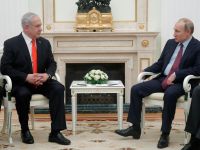Israel emerged the winner from the make-or-break Middle East summit Tuesday but the ceasefire announced by US President Bill Clinton may not be enough to quell the Palestinian "Intifada" and the wave of deadly violence that has left the Middle East peace process in tatters.
Clashes continued unabated on Tuesday despite the accord, with two Palestinians shot dead -- one of them killed by Israeli soldiers some four hours after Clinton's declaration aimed at halting a 20-day cycle of violence.
"We have achieved our objectives," Prime Minister Ehud Barak told Israeli television from the summit in the Egyptian resort of Sharm el-Sheikh, but added: "The test will lie in the implementation."
In addition to the ceasefire, Barak was also claiming as a victory the fact that there would be no international probe into the unrest -- a key demand of Arafat's that led to the failure of a summit in Paris 12 days ago -- but rather a US-led fact-finding committee.
And the Palestinians could barely disguise their disappointment over the results of the hastily convened meeting, with top militants from Palestinian leader Yasser Arafat's own Fateh faction and the Islamic fundamentalist Hamas vowing that the resistance against Israel would continue.
Arafat's decision to go to Sharm el-Sheikh ahead of a planned Arab summit was seen as a reluctant move in the face of enormous pressure from the Americans, the Europeans and even the Egyptians, and the Palestinians feared the worst.
Prominent Palestinian MP Hanan Ashrawi said the Palestinians were "enraged" at the agreement, feeling that it had been extracted from their leader under duress.
"It's like putting a sticking plaster on a deep wound," she told AFP.
Clinton, who has seen his hopes of crowning his term of office with a Middle East peace deal shattered by the bloodshed, said both Israelis and Palestinians had agreed to issue public statements "unequivocally calling for an end to the violence."
This was a key demand of Barak, who has accused Arafat of orchestrating the worst violence in years that has left more than 110 people dead, and failing to call for calm among his people.
The clashes were triggered by a visit by Israel's hardline opposition leader Ariel Sharon to the hotly contested Al-Aqsa mosque complex in Jerusalem's Old City, which the Palestinians say defiled the third holiest shrine in the Muslim world.
The site is known to Jews as Temple Mount, their "holiest of holies."
Arafat had been insisting on a full-blown international commission of inquiry into the events, but Clinton announced only a "fact-finding" committee headed by the United States that would submit its report to the United Nations.
Palestinian information minister Yasser Abed Rabbo said the results from the summit were "bare minimum."
The only two concrete results for the Palestinians announced by Clinton were the withdrawal of Israeli forces and equipment to their positions before the explosion of violence, and the lifting of the blockade around Palestinian areas.
But even here, nothing has been finalized. Barak said that he had committed just to "examining" when the lifting of the blockade would be appropriate.
Israel has justified the closure of the territories -- which came into force ahead of Yom Kippur, the holiest day on the Jewish calendar on October 9 -- to protect it from possible attack by Palestinian militants.
And frustrated Palestinians showed no signs of wanting an end to their struggle against more than three decades of Israeli occupation.
"The revolt will continue as long as the Israeli occupation, that is the decision of the Palestinian people," Marwan Barghouthi, Fatah's West Bank leader, told journalists during an anti-Israel protest -- JERUSALEM (AFP)
© 2000 Al Bawaba (www.albawaba.com)







